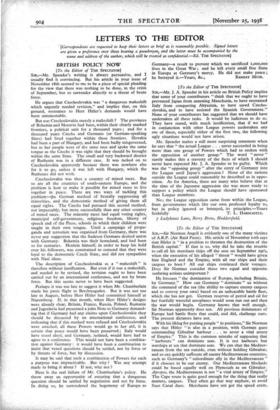BRITISH POLICY NOW
LETTERS TO THE EDITOR
[Correspondents are requested to keep their letters as brief as is reasonably possible. Signed letters are given a preference over those bearing a pseudonyms and the latter must be accompanied by the name and address of the author, which will be treated as confidential.—Ed. THE SPECTATOR] [To the Editor of THE SPECTATOR] SIR,-Mr. Spender's writing is always persuasive, and I usually find it convincing. But his article in your issue of November ath seemed to me to be a piece of special pleading for the view that there was nothing to be done, in the crisis of September, but to surrender abjectly to a threat of brute force.
He argues that Czechoslovakia was " a dangerous makeshift which urgently needed revision," and implies that, on this ground, resistance to Herr Hitler's demands would have been unreasonable.
But was Czechoslovakia merely a makeshift ? The provinces of Bohemia and Moravia had been, within their clearly marked frontiers, a political unit for a thousand years ; and for a thousand years Czechs and Germans (or German-speaking Slays) had lived together within these frontiers. Slovakia had been a part of Hungary, and had been badly misgoverned, but as her people were of the same race and-spoke the same tongue as the Czechs it was right that they should be brought within the same State. The small and very backward district of Ruthenia was in a different case. It was tacked on to Czechoslovakia apparently because there was nowhere else for it to go, unless it was left with Hungary, which the Ruthenes did not wish.
Czechoslovakia was thus' a country of mixed races. But so are all the countries of south-eastern Europe, and the problem is how to make it possible for mixed races to live together in peace. There are two ways of tackling this problem—tpe German method of brutally suppressing all minorities, and the democratic method of giving them all equal rights. The Czechs had pursued this second method, not impeccably, but more successfully than any other country of mixed races. The minority races had equal voting rights, municipal self-government,, religious freedom, liberty of speech and of the Press, schools in which their children were taught in their own tongue. Until a campaign of propa- ganda and terrorism was organised from Germany, there was never any suggestion that the Sudeten Germans desired union with Germany. Bohemia was their homeland, and had been so for centuries. Henlein himself, in order to keep his hold over his followers, was constrained to contend that they were loyal to the democratic Czech State, and did not sympathise with Nazi ideas.
The description of Czechoslovakia as a " makeshift " is therefore without justification. But even if it was a makeshift, and needed to be revised, the revision ought to have been carried out by an international conference, and not by brute force. But this seems never to have been suggested.
Perhaps it was too late to suggest it when Mr. Chamberlain made his panic flight to Berchtesgaden. But it was not too late in August, before Herr Hitler had committed himself at Nuremberg. If, in that month, when Herr Hitler's designs were already clear, Britain, France, Russia, Poland, Rumania and Jugoslavia had presented a joint Note to Germany demand- ing that if Germany had any claims upon Czechoslovakia they should be discussed by an international conference, and indicating that if this method were refused and Czechoslovakia were attacked, all these Powers would go to her aid, it is certain that peace would have been preserved ; Italy would have stood aloof, and Germany, isolated, would have had to agree to a conference. This would not have been a combina- tion against Germany : it would have been a combination to insist that vexed questions should be settled, not by force or by threats of force, but by discussion.
It may be said that such a combination of Powers for such a purpose was impracticable. But why ? Was any attempt made to bring it about ? If not, why not ?
Here Is the real failure of Mr. Chamberlain's policy. He threw away an opportunity of ensuring that a dangerous question should be settled by negotiation and not by force. In doing so, he surrendered the hegemony of Europe to .Germany—a result to prevent which we sacrificed t,000,000 lives in the Great War ; and he left every small free State in Europe at Germany's mercy. He did not make peace ;














































 Previous page
Previous page